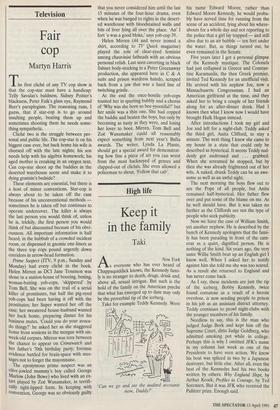Television
Fair cop
Martyn Harris
The first cliche of any TV cop show is that the cop-star must have a handicap: Telly Savalas's baldness, Sidney Poitier's blackness, Peter Falk's glass eye, Raymond Burr's paraplegism. The reasoning runs, I guess, that if star-cop is to go around insulting people, beating them up and sometimes shooting them he needs some- thing sympathetic.
Cliché two is the struggle between per- sonal and public life. The cop-star is on his biggest case ever, but back home his wife is cheesed off with the late nights; his son needs help with his algebra homework; his aged mother is croaking in an oxygen tent. Can cop-star shoot up the baddies in the deserted warehouse scene and make it to dying grannie's bedside?
These elements are essential, but there is a host of minor conventions. Star-cop is always about to be taken off the case because of his unconventional methods sometimes he is taken off but continues to operate undercover. The killer is always the last person you would think of, unless he is, trickily, the first person you would think of but discounted because of his obvi- ousness. All important information is half heard, in the hubbub of a crowded incident room, or dispensed in gnomic one-liners as the three top cops pound urgently down corridors in arrow-head formation.
Prime Suspect (ITV, 9 p.m., Sunday and Monday) had every cliche in the book. Helen Mirren as DCI Jane Tennison was alone in a station-house of boozing, boxing, woman-baiting yob-cops, 'skippered' by Tom Bell. She was on the trail of a serial killer of prostitutes, but half the pig-eyed yob-cops had been having it off with the prostitutes; her Super wanted her off the case; her sweatered house-husband wanted her back home, preparing dinner for his business mates. 'Could you do your avoca- do thingy?' he asked her as she staggered home from sessions in the morgue with six- week-old corpses. Mirren was torn between the chance to appear on Crimewatch and her father's 70th birthday party; forensic evidence battled for brain-space with mes- sages not to forget the mayonnaise.
The eponymous prime suspect was an olive-jowled mummy's boy called George Marlow (John Bowe) who lived with an ex- tart played by Zoe Wanamaker, in terrifi- , tally tight-lipped form. In keeping with Convention, George was so obviously guilty that you never considered him until the last 15 minutes of the four-hour drama, even when he was banged to rights in the desert- ed warehouse with bloodstained walls and bits of liver lying all over the place. 'An' I fort 'e was a good bloke,' says yob-cop 39.
Helen Mirren (44 and never ironed a shirt, according to TV Quick magazine) played the role of clear-eyed feminist among chauvinist fatheads with an obvious personal relish. Last seen cavorting in black fishnet body-stocking in a Peter Greenaway production, she appeared here in C & A suits and prison wardress hairdo, scraped back from a jaw that was a hard line of twitching gristle.
At the end the once-hostile yob-cops toasted her in spurting bubbly and a chorus of 'Why was she born so bee-yyootiful?' but her smile was a thin one. She had copped the baddie and beaten the boys, but only by becoming as nasty as they were, and losing her lover to boot. Mirren, Tom Bell and Zoe Wanamaker could all reasonably expect something from next year's Bafta awards. The writer, Lynda La Plante, should get a special award for demonstrat- ing how fine a piece of art you can wrest from the most hackneyed of genres and clapped-out of cliches. She even allowed a policeman to shout, 'Follow that cab'.


























































 Previous page
Previous page